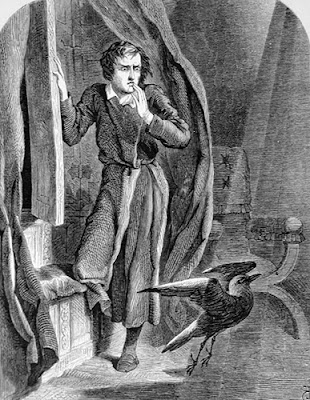 |
| Painting by Marion Rose Fine Art. |
I've written before about ravens - those cocky, raucous, smart-ass birds. But apparently I'm not the only one with an affinity for them. Seems a couple of well-known writers had an affinity for them, too.
Charles Dickens loved animals, and had in his lifetime three pet ravens. Each one of them was named "Grip". Grip the First died in 1841, possibly from eating chips of lead paint from a wall being prepared for repainting. Dickens had the bird preserved and mounted in a glass display case for his study. After Dickens's death, a fan bought the taxidermied bird and donated him to the Free Library of Philadelphia, where he sits today. He was known in the Dickens household as "Grip the Clever", "Grip the Wicked", and "Grip the Knowing".
 |
| Grip the First in the Free Library of Philadelphia. |
Grip was loved by the Dickens kids, even though he bit their ankles. He could talk, saying things like "Hello, Old Girl", "Never say die", "Keep up your spirit", and "Polly put the kettle on, we'll all have tea". He slept on horseback in the stables. Mamie Dickens, daughter of Charles, wrote that Dickens loved animals, flowers, and birds, but most strongly his ravens. There were flocks of them at Devonshire Terrace, the Dickens family home.
 |
| Three of Dickens's ten children with Grip. Drawing by Daniel Maclise, 1841. |
Dickens was writing Barnaby Rudge when Grip died, and in the interest of further studying ravens, another Grip took his place, but it was the first who gave Dickens the idea of making a raven a character in the book. Initially, the book did not have any reference to a raven.
 |
| Barnaby Rudge and Grip. Ink and wash drawing by Fred Barnard, courtesy of the Dickens Museum. |
Barnaby Rudge originally was printed in serialized form between 1840 and 1841. Edgar Allan Poe was working in Philadelphia for Graham's Magazine at the time and reviewed the book in the February 1842 issue. The 12-column review applauds Dickens's effort, mostly praising him for his ability to write dramatic characters. Poe does mention a couple of flaws, one concerning the raven: "The Raven, too, intensely amusing as it is, might have been made more than we now see it, a portion of the conception of the fantastic Barnaby. Its croakings might have been prophetically heard in the course of the drama."
 |
| John Tenniel's illustration for "The Raven", 1858. |
In chapter 17 of Barnaby Rudge, Barnaby throws his raven lumps of meat. When he exhausted his supply he told the raven, "That's all", to which the Grip, the raven, cried, "More! More!"
Three years later Poe published his narrative poem "The Raven" in the New York Evening Mirror. Poe was so obviously influenced by Dickens, hence Grip. He never denied the inspiration. He even mentioned Barnaby Rudge in his companion essay to his poem, "The Philosophy of Composition". Other writers noticed the similarity as well. James Russell Lowell, of the Fireside Poets, in 1848, wrote in his satirical book A Fable for Critics:
Here comes Poe with his raven, like Barnaby Rudge.
Three-fifths of him genius and two-fifths fudge.
Dickens and Poe met at least once, in 1842, in Philadelphia. Poe had sent some of his works, as well as his review of Barnaby Rudge, to Dickens prior to their meeting. Aside from the content of letters exchanged between them, we know little of what they spoke about. We do know that Poe asked Dickens to help him find a publisher in England. Apparently Dickens made attempts to do so, but nothing came of them. There was an anonymous critique of Poe in an English journal, which Poe attributed to Dickens. This critique and the fact that Dickens didn't find a publisher for him led to a falling out between the two writers.
 |
| Illustration for the final lines of "The Raven" by Gustave Doré, 1884, Library of Congress. |
Both went on with their respective careers, having intersected briefly but bound for eternity by a raven. Clever bird. Not only did it inspire two famous writers, but it came out looking quite the sagacious creature in both their works. The American Library Association even designated Grip a "Literary Landmark". All the result of Dickens giving Poe the (concept of a) bird.
*******************************
No comments:
Post a Comment
NOTE: COMMENTS WITH LINKS WILL NOT BE POSTED!